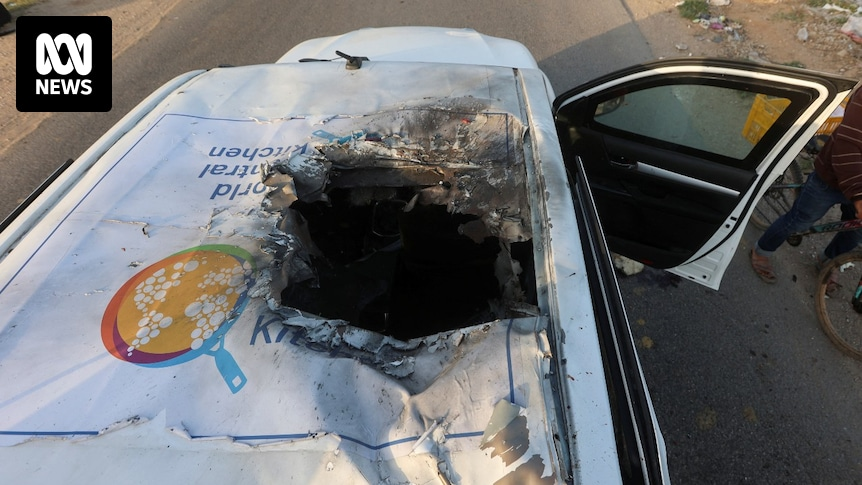The recent Israeli investigation into the killing of 15 Palestinian aid workers has ignited fierce debates over military accountability in the context of the ongoing Gaza conflict. An internal report commissioned by the Israeli Defense Forces (IDF) acknowledged ‘professional failures’ and breaches of protocol that contributed to this tragic event, involving paramedics and emergency responders who were clearly marked as non-combatants. The Gaza paramedic deaths not only reignited discussions around the conduct of Israel’s military but also underscored the perilous realities faced by Palestinian emergency workers on the ground. International announcements have called for further inquiry, raising questions about the legality of the actions taken by Israeli soldiers, especially in light of claims related to the treatment of these aid workers. As this evolving crisis continues to unfold, updates from Gaza conflict news sources become crucial for understanding the broader implications of the IDF investigation and its findings.
The tragic incident involving the deaths of 15 Palestinian humanitarian workers serves as a stark reminder of the dangers present in conflict zones, particularly for those rendering aid. The Israeli military’s admission of procedural errors highlights significant concerns regarding their operational protocols and the treatment of individuals designated as non-combatants. With the recent focus on the implications of such actions, many are now examining the conditions surrounding the Gaza emergency response teams and the inherent threats they face amidst ongoing hostilities. Discussions regarding the military’s accountability in the deaths of these aid workers echo the larger discourse surrounding the ethics of warfare and the protection granted to humanitarian workers under international law. As the narrative unfolds, it becomes increasingly pertinent for global observers to remain informed about the implications of these findings on both Israeli and Palestinian communities.
Israeli Investigation into Aid Worker Killings: A Deep Dive
The recent report by the Israeli Defense Forces (IDF) regarding the killings of 15 Palestinian aid workers in Gaza has raised numerous questions not only about the actions taken but also about the values underlying Israel’s military operations. The IDF termed the event as a series of ‘professional failures’ and indicated that there were significant breaches of engagement protocols that led to the loss of innocent lives. This admission has been critical in providing some level of transparency, considering the international outrage that followed the killings. The investigation’s findings have ignited calls for further inquiry into how emergency workers, including paramedics and civil defense staff, were mistakenly identified as threats during military operations.
As the report unfolded, it highlighted a troubling narrative: the soldiers involved attributed their actions to misjudgment, significantly underlining the challenges faced in the fog of war, particularly in a densely populated area such as Gaza. Brig. Gen. Ephraim Defrin’s assertion that there was no intention to deceive has sparked debates over the ethics of military conduct amidst such chaotic environments. The implications of these findings extend beyond the immediate incident, touching on broader issues of accountability within military forces and the safety of first responders in conflict zones globally.
Understanding the Context: Gaza Paramedics and Their Roles
Palestinian emergency workers, especially paramedics, play an essential role in conflict zones like Gaza, where access to medical care is often limited due to ongoing violence. Their presence is critical not only for providing immediate medical assistance but also for serving as a lifeline for civilians caught in the crossfire. The deaths of the 15 aid workers, including well-recognized figures like paramedic Mohamed Bahloul, underscore the dangerous and often lethal environments these workers navigate daily. Their targeted killings are seen not only as a personal tragedy but as a devastating blow to the humanitarian operations in the region.
The role of Palestinian emergency workers extends beyond merely responding to injuries; they symbolize resilience amidst adversity. Each incident of violence against them compounds the trauma experienced by the communities they serve, drawing attention to the urgent need for international humanitarian laws to be respected by all parties involved in the conflict. The deaths have reignited discussions about civilian protection during military operations, pointing to the critical need for adherence to established protocols that safeguard those providing medical care on the front lines.
Evidence and Accountability: Challenges in the IDF Report
The internal report released by the IDF has prompted much skepticism regarding its thoroughness and the factual accuracy of the claims made. While it acknowledged ‘several professional failures’ in the operation, many questions remain unanswered, particularly concerning the identification of the slain as Hamas operatives. The IDF initially claimed that six of the 15 emergency workers were involved with militant activities; however, this assertion was curiously omitted from the final report. Such discrepancies have only fueled calls for an independent investigation to ensure accountability and provide clarity to the affected families and the global community.
Moreover, the elements of the report that suggest failures in military protocol and the handling of emergency workers highlight a significant challenge in military operations: ensuring that combatants and non-combatants are correctly distinguished during engagements. This failure not only breaches established international humanitarian standards but also raises serious concerns about the operational integrity and training within the IDF. For the international community, these findings demand a reevaluation of military engagements in civilian spaces to prevent future tragedies.
Media Coverage and Public Reaction: The Fallout from the Killings
The media coverage surrounding the killings of Palestinian aid workers has sparked widespread condemnation and intense scrutiny of the Israeli military’s actions and procedures. News outlets have reported extensively on this incident, emphasizing the toll on emergency workers in conflict areas. The public outcry, driven by footage and testimonies from eyewitnesses, has highlighted the necessity of transparent military practices to foster trust and dialogue in tense geopolitical climates. The complex dynamics of media reporting also illustrate the different narratives that emerge, particularly between local Palestinian sources and international news agencies.
As various human rights organizations weigh in on the ramifications of the IDF’s actions, there has been a significant push for accountability on an international stage. Activists argue that the Israeli military must be held to a higher standard due to the repeated incidences of violence against emergency workers. This incident, among others, has drawn attention to the broader context of the Gaza conflict, underscoring the urgent need for comprehensive peace talks that prioritize the safety of civilians and humanitarian workers alike.
International Response and Humanitarian Implications
Following the IDF’s report, there has been an international outcry for accountability regarding the killings of the Palestinian aid workers. Humanitarian organizations have called for an independent inquiry into the incident, stressing that such events represent a severe violation of international humanitarian law. The widespread documentation of these killings through video evidence has only strengthened the case for accountability, with many advocates asserting that such tragic events must serve as a catalyst for change in how military operations are conducted in populated areas.
Additionally, this incident raises significant questions about the treatment of humanitarian personnel in conflict zones. As these workers often face direct threats to their safety, international bodies must advocate for stronger protections and clearer operational guidelines for military engagements. Encouraging adherence to international laws not only protects humanitarian workers but also fosters a culture of respect for civilian life during military operations, a crucial step towards establishing long-lasting peace in regions afflicted by violence.
Military Protocols and Emergency Response: Lessons Learned
The tragic events leading to the killing of the Palestinian aid workers highlight a pressing need to reassess military protocols surrounding emergency response during conflicts. The IDF’s admission of professional failures points to systemic issues that, if left unaddressed, could result in ongoing casualties among non-combatants and emergency personnel. A fundamental aspect of military training must involve understanding the unique qualities and visual identifiers of emergency vehicles, which can include flashing lights and distinctive insignia. Ensuring that troops are adequately trained in these areas is essential in preventing future tragedies.
Furthermore, this situation exemplifies the critical importance of effective communication channels between military operations and humanitarian agencies. Establishing clear lines of communication can facilitate better recognition of emergency situations and prevent misidentification of civilian vehicles. Lessons drawn from this incident could foster improved protocols that would not only enhance operational effectiveness but also prioritize the preservation of civilian life in future military engagements. Such mechanisms are vital in rebuilding trust with affected communities while ensuring that humanitarian missions can continue unimpeded.
Historical Context of the Gaza Conflict: A Chronicle of Violence
The broader implications of the IDF report resonate within the historical context of the Gaza conflict, characterized by persistent violence and strained relations between Israel and Palestine. The recurrent killings of Palestinian emergency workers can be traced back to a backdrop of hostility, where military actions often overshadow humanitarian concerns. In examining these events, one recognizes the cycle of violence that continues to plague the region, complicating efforts for lasting peace and stability. Each incident adds to a cumulative narrative of loss and suffering, where civilians are often the first casualties of conflict.
Understanding the historical context also emphasizes the challenges faced by international organizations advocating for peace and security. Previous attempts at ceasefire agreements, such as the one recently broken by Israel, often highlight the fragility of peace in the region. The deaths of aid workers signal a grim reminder of the ongoing humanitarian crisis in Gaza, necessitating a reassessment of how military and humanitarian efforts can coexist to protect civilian lives. Moving forward, this calls for a renewed commitment from all stakeholders to prioritize dialogue and build pathways that promote reconciliation.
Future Investigations: Pathways Toward Justice
As discussions around the killings of Palestinian aid workers persist, the need for thorough and transparent investigations remains paramount. The recent admission by the IDF may pave the way for more formal inquiries from international bodies, further pressuring Israel to address its military conduct. Achieving justice for the victims and their families is crucial, not just for the individuals affected but for the broader landscape of military operations in conflict zones, where accountability must be woven into the fabric of engagement rules.
Advocates for human rights are now more than ever pushing for mechanisms that ensure such tragedies are not repeated. Calls for the gathering of comprehensive evidence, including testimonies from witnesses and documentation of military procedures, are gaining momentum. Establishing an independent commission that monitors military actions and enforces compliance with international law could significantly alter the dynamics of accountability in future conflicts. This step is crucial to safeguarding humanitarian missions and ensuring that emergency workers can operate without the threat of violence.
Building Bridges: The Role of Diplomacy in Conflict Resolution
Amidst the fallout from the recent killings, the necessity for diplomatic engagement cannot be overstated. The international community has a pivotal role in mediating dialogue between conflicting parties to foster an environment where future incidents can be avoided. Workshops and discussions centering around the protection of civilians and humanitarian personnel are crucial in cultivating awareness and respect for human rights obligations. Diplomacy focused on conflict resolution not only serves to honor those lost but also sets a precedent for positive change in military practices.
Effective diplomacy can lay the foundation for comprehensive peace negotiations, promoting stability in the region. Collaborative efforts between Israel and Palestine that prioritize humanitarian objectives should be championed, as they provide avenues for economic development and societal healing. By emphasizing the importance of humanitarian workers, such initiatives can restore faith in emergency services and demonstrate the undeniable value they hold in all societies, particularly in conflict-laden areas such as Gaza.
Frequently Asked Questions
What were the findings of the Israeli investigation into the killings of Palestinian aid workers?
The Israeli investigation revealed numerous ‘professional failures’ and ‘breaches of order’ in the deaths of 15 Palestinian aid workers in Gaza, including paramedics and U.N. personnel. The IDF admitted to mistakes but claimed that these were operational errors rather than intentional acts of harm.
How many Palestinian aid workers were killed by the IDF during the recent Gaza conflict?
The IDF’s actions resulted in the deaths of 15 Palestinian aid workers, including paramedics and civil defense staff members, during the Gaza conflict. This incident prompted uproar and calls for more thorough investigations.
What did the IDF report say regarding the circumstances of the Gaza paramedic deaths?
The IDF’s report indicated that the paramedic deaths occurred due to poor visibility and misidentification of emergency vehicles as threats during an operation targeting Hamas operatives. The investigation noted failures in following operational protocols.
What international laws were cited in response to the killing of Palestinian emergency workers?
Critics, including the Palestine Red Crescent Society, stated that targeting medics can be classified as a war crime under international humanitarian law, which has been a focal point of accusations against Israeli forces during the Gaza conflict.
Did the IDF provide a definitive explanation for the allegations against the slain aid workers?
The IDF’s investigation did not conclusively prove that any of the 15 slain aid workers were affiliated with Hamas, leading to skepticism regarding their initial claims that six were operatives. This has raised questions in the aftermath of the killings.
What actions were taken against IDF personnel following the investigation into the aid worker killings?
Following the investigation into the killings of Palestinian aid workers, the IDF dismissed the field commander responsible for the incident and reprimanded a senior officer. These actions were seen as steps towards accountability amid the controversy.
How did the international community respond to the IDF’s killings of emergency workers in Gaza?
The international community reacted with widespread condemnation of the IDF’s actions and called for an independent investigation into the killings of Palestinian aid workers, reflecting concerns over adherence to humanitarian laws during the Gaza conflict.
What inconsistencies were found in the IDF’s original account of the Gaza paramedic shootings?
Inconsistencies in the IDF’s official account arose when video evidence contradicted their claims. Cellphone footage showed ambulances with flashing lights being targeted, challenging the narrative that the vehicles lacked identification.
What was the significance of the mass grave found following the killings of Palestinian aid workers?
The discovery of a mass grave containing the bodies of Palestinian aid workers heightened tensions and highlighted concerns regarding the IDF’s operational conduct during the conflict, leading to demands for transparency and accountability.
How does this incident relate to broader issues in the Gaza conflict?
The killings of Palestinian aid workers and the subsequent Israeli investigation underscore ongoing humanitarian concerns and operational challenges faced during the Gaza conflict, raising critical questions about military conduct and the protection of civilians.
| Key Points |
|---|
| Israeli Defense Forces (IDF) shot 15 Palestinian aid workers, including paramedics and a U.N. employee, in Gaza on March 23. |
| The IDF acknowledged ‘professional failures’ and breaches of order during the incident. |
| The report led to the discharge of the field commander involved and reprimands for senior officers. |
| The incident has sparked outrage and calls for an independent investigation due to conflicting accounts and video evidence. |
| The Palestine Red Crescent described the targeting of medics as a potential war crime. |
| IDF claimed they mistook the aid workers for Hamas operatives, citing poor visibility and malfunctioning night vision equipment. |
Summary
The Israeli investigation into the aid worker killings reveals serious issues within the military operations during the incident. This tragic event highlights the critical need for accountability and adherence to humanitarian laws in combat situations. As the investigation continues to unfold, transparency and impartial reviews are necessary to restore trust and prevent future tragedies of this nature.



